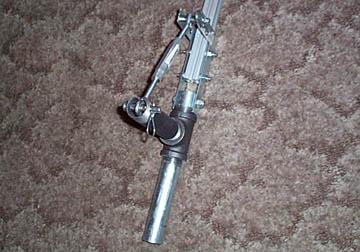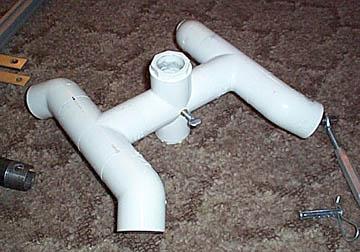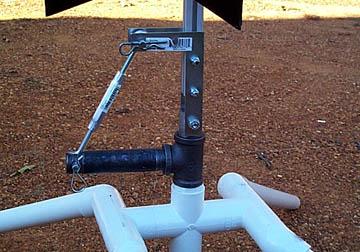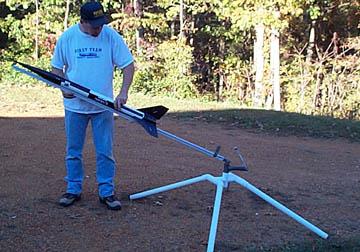Scratch Inexpensive Rail Launch Pad
Scratch - Inexpensive Rail Launch Pad {Scratch}
Contributed by David Logan
| Published: | 2010-09-09 |
| Manufacturer: | Scratch |
 Brief:
Brief:
An inexpensive solution for a rail pad using the 80/20 rail. Made of a combination of PVC and metal pipe, using nothing but a hack saw, a drill, and a Dremel. This pad should be able to handle any Level 1 flight.
Construction:
Parts list:
- Three 5ft lengths of SCH40 PVC pipe (one 10ft and one 5ft would be cheaper).
- Two 1 1/4" PVC Tees
- Two 1 1/4" to 1" PVC Bushings
- One 1 1/4" PVC Cross
- Four 1 1/4" elbows 45 degree
- One 1" x 8" metal nipple
- One 1" metal T
- One 1" x 6" metal nipple
- Two 3/8 x 2" clevis pins
- Two hitch pin clips
- One 5/16 turnbuckle set (get the set with eyes at both ends)
- Four 1/4-20 x 1" carriage bolts
- One box of 1/4-20 washers
- One box of 1/4-20 locking nuts
- Two flat corner braces
- One 1/4-20 wood insert nut
- One 1/4-20 x 1 1/2" thumb screw
- Two 3/8 x 1/2 x 1 1/2" steel spacers
- One 3/8" x 2" hex head bolt with locking nut
- PVC Cement
 My first order of business was gluing the 1 1/4" to 1" PVC bushings into the PVC cross directly opposite each other. Next, I sanded the inside of the bushings until the 8" metal nipple was able to slide through the cross, keeping the fit snug. Once that was done, the 8" nipple was cut into a 6" section, and a 2 " section. These were then screwed into each end of the metal tee. Now screw the 6" nipple into the side outlet of the tee. It was now time to fit the L brackets to the rail, and shim them to fit length wise on top of the 2" metal pipe. Once it was shimmed to fit, a 3/8" hole was drilled through the 2" section at a 90 degree angle to the side outlet of the tee, and the L bracket rail assembly was attached using the 3/8" x 2" bolt and lock nut. This creates the hinge for the rail. Next I cut a notch into the top of the open end of the 6" nipple, and drilled the holes for the turnbuckle attachment. In each end of the turnbuckle, drive one of the steel spacers into the "eye". These will need to be cut to fit one between the two L brackets, and one inside the 6" nipple at the notched end. Place one end of the turnbuckle assembly between the L brackets at one set of holes, and insert a clevis pin and hitch pin. Place the other end of the turnbuckle into the slot in the 6" nipple and insert the other clevis pin and hitch pin. This completes the hinge and altitude adjustment assembly.
My first order of business was gluing the 1 1/4" to 1" PVC bushings into the PVC cross directly opposite each other. Next, I sanded the inside of the bushings until the 8" metal nipple was able to slide through the cross, keeping the fit snug. Once that was done, the 8" nipple was cut into a 6" section, and a 2 " section. These were then screwed into each end of the metal tee. Now screw the 6" nipple into the side outlet of the tee. It was now time to fit the L brackets to the rail, and shim them to fit length wise on top of the 2" metal pipe. Once it was shimmed to fit, a 3/8" hole was drilled through the 2" section at a 90 degree angle to the side outlet of the tee, and the L bracket rail assembly was attached using the 3/8" x 2" bolt and lock nut. This creates the hinge for the rail. Next I cut a notch into the top of the open end of the 6" nipple, and drilled the holes for the turnbuckle attachment. In each end of the turnbuckle, drive one of the steel spacers into the "eye". These will need to be cut to fit one between the two L brackets, and one inside the 6" nipple at the notched end. Place one end of the turnbuckle assembly between the L brackets at one set of holes, and insert a clevis pin and hitch pin. Place the other end of the turnbuckle into the slot in the 6" nipple and insert the other clevis pin and hitch pin. This completes the hinge and altitude adjustment assembly.
 For the base, dry fit all parts first and mark their locations!! Cut four 30" long sections of 1 1/4" PVC pipe to make the legs. Cut six pieces, 2 1/4" long to be used to join the fittings together. Now dry fit all of the pieces together, starting with the cross. Place a tee at each end of the cross (without bushings). At each end of the tees, place an elbow. Insert a leg into each elbow. This is the tricky part. Get the legs at an angle and height you are comfortable with, making sure to keep the cross level, and the ends with bushings vertical. Mark and number all joints so they can be reassembled in the same positions. Now, one at a time, glue all of the pieces together, except the legs. You will have to be careful lining up the parts as the glue sets up very quickly.
For the base, dry fit all parts first and mark their locations!! Cut four 30" long sections of 1 1/4" PVC pipe to make the legs. Cut six pieces, 2 1/4" long to be used to join the fittings together. Now dry fit all of the pieces together, starting with the cross. Place a tee at each end of the cross (without bushings). At each end of the tees, place an elbow. Insert a leg into each elbow. This is the tricky part. Get the legs at an angle and height you are comfortable with, making sure to keep the cross level, and the ends with bushings vertical. Mark and number all joints so they can be reassembled in the same positions. Now, one at a time, glue all of the pieces together, except the legs. You will have to be careful lining up the parts as the glue sets up very quickly.
 The last step is optional. In one side of the cross, drill a hole, and screw in a threaded brass insert being careful not to get it in too far. Now screw in a thumb screw into the insert and this will allow locking the horizontal adjustment into place.
The last step is optional. In one side of the cross, drill a hole, and screw in a threaded brass insert being careful not to get it in too far. Now screw in a thumb screw into the insert and this will allow locking the horizontal adjustment into place.
After all of the glue has set, insert the legs. A small slit can be cut length wise into one end of each leg to make installing and removing easier. Now, drop the rail assembly into the cross, and there it is, a sturdy cheap rail pad. Vertical adjustment is done by adjusting the turnbuckle. The whole rail assembly can rotate in the base for horizontal adjustment. and to load a rocket on the rail, just pull one of the pins out, and the rail can be laid down for loading.
For a blast deflector, a rectangular piece of sheet metal, say 6" x 18", can be bent to form a triangle, and held on the rail with rail buttons. This suggestion is courtesy of Matt Stum of railbuttons.com.

 |
 |
 |
 |
Rick Reid (November 24, 2014)
Great minds do seem to think alike. The Pad I've scratch built is 95% like yours. The 1 big diff is that instead of having pivot to lower the rail, I made it "fixed". I went thru the tee and let the rail rest on the grounnd. I've since made a "Peg leg" so I don't lose as much rail height. All I do now is tip the whole pad over and use a broom handle to prop it up. I have planed out a tilt just never gotten around to building it.
All I do now is tip the whole pad over and use a broom handle to prop it up. I have planed out a tilt just never gotten around to building it. 